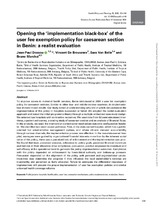Opening the 'implementation black-box' of the user fee exemption policy for caesarean section in Benin: A realist evaluation

View/
Date
2020Author
Van Belle, Sara
Dossou, Jean Paul
De Brouwere, Vincent
Metadata
Show full item recordAbstract
To improve access to maternal health services, Benin introduced in 2009 a user fee exemption policy for caesarean sections. Similar to other low- and middle-income countries, its implementation showed mixed results. Our study aimed at understanding why and in which circumstances the implementation of this policy in hospitals succeeded or failed. We adopted the realist evaluation approach and tested the initial programme theory through a multiple embedded case study design. We selected two hospitals with contrastive outcomes. We used data from 52 semi-structured interviews, a patient exit survey, a costing study of caesarean section and an analysis of financial flows. In the analysis, we used the intervention-context-actor-mechanism-outcome configuration heuristic. We identified two main causal pathways. First, in the state-owned hospital, which has a public-oriented but administrative management system, and where citizens demand accountability through various channels, the implementation process was effective. In the non-state-owned hospital, managers were guided by organizational financial interests more than by the inherent social value of the policy, there was a perceived lack of enforcement and the implementation was poor.
